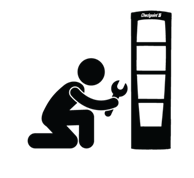 Retail alarms are necessary to ensure a store is protected against break-ins and even theft from within. I know from personal experience that they work. As a Loss Prevention Manager I once had to respond to a burglary alarm when two young men threw a cement block through the front doors of my store in the middle of the night. I also responded to a number of false alarms due to system errors and failures. As a Manager On Duty I know that it can be stressful wondering if you locked all the doors and set the alarm at the end of the night. With those situations in mind, I would like to provide some practical tips to help avoid excessive false alarms and worry about building security.
Retail alarms are necessary to ensure a store is protected against break-ins and even theft from within. I know from personal experience that they work. As a Loss Prevention Manager I once had to respond to a burglary alarm when two young men threw a cement block through the front doors of my store in the middle of the night. I also responded to a number of false alarms due to system errors and failures. As a Manager On Duty I know that it can be stressful wondering if you locked all the doors and set the alarm at the end of the night. With those situations in mind, I would like to provide some practical tips to help avoid excessive false alarms and worry about building security.
DO
- Schedule regular alarm tests for your store(s). Doing a walkthrough test once a month is good practice. This can be done by the store owner or management before the start of a business day or after close when customers and employees have left.
- Have two people conduct the alarm test. They can walk the building together or one can stay near the alarm panel and monitor the alarm points or zones as they are activated.
- Your alarm system should be monitored by an alarm company. Notify them when you are starting and ending your alarm test so they don’t request a false police response. At the end of the test ask for a copy of the test results. They should be able to provide a digital copy to you with a day or two.
- Have at a minimum, an annual alarm inspection by a technician from the alarm company or one of their certified contractors. They can do a more detailed inspection of alarm sensors and contact points, making sure there is no excessive wear and tear or damage due to moving parts.
- Have a current list of building alarm responders on file with your alarm company and the police department responsible for the jurisdiction where your store is located. Should a key holder/responder leave, make sure the list is updated. This goes for phone numbers as well. There is nothing more frustrating for a dispatcher than to call an out of service number or a call list that is no longer current.
- Have employees conduct a final walk of the building at the end of the day when the doors are locked. Check restrooms and off-stage areas, including break rooms and janitor closets to make sure no one is “hiding out,” waiting for employees to leave so they can steal and run out through a fire exit.
- Have at least two people close the store. They can look out for each other as they leave and verify doors are locked and alarms are set.
DON’T
- Schedule alarm tests for the same date every month. Establishing patterns can tip off a potential robber of when the alarm system will be in “test” mode and not active for a police dispatch.
- Allow someone to conduct an alarm test alone. For their safety it isn’t good practice to leave a person alone in a store or building. Remember, there is always safety in numbers.
- Ignore an alarm zone issue. When setting the alarm at the end of the night, if an alarm zone fails to set, don’t automatically try to bypass it. You should have a zone description list that identifies where the alarm points are located. Check the point, making sure that door is secure. If you cannot identify the problem for the night, contact your alarm company, describe the issue and arrange for a technician to come out the next day. They can help you shunt the one zone while still alarming the rest of the building. Call your local police department and ask for a police check once or twice that night. Let them know you are having an issue with your alarm system. Most departments are willing to send a patrol by at least once to check your store.
- Finally, don’t automatically respond to a phone call that your alarm is going off. Ask for a call back number and the caller’s name. You should have the alarm company phone number available, call them and verify the alarm activation and the name of the person who called you. If you are responding to an alarm, call the police and ask if someone can meet you at the building. Stay in your vehicle until an officer arrives, then enter together. NEVER enter the building by yourself when responding to an alarm.
Following these retail alarm system tips you will be able to sleep easy at night knowing you are protecting your business AND your employees.

Speak Your Mind
You must be logged in to post a comment.